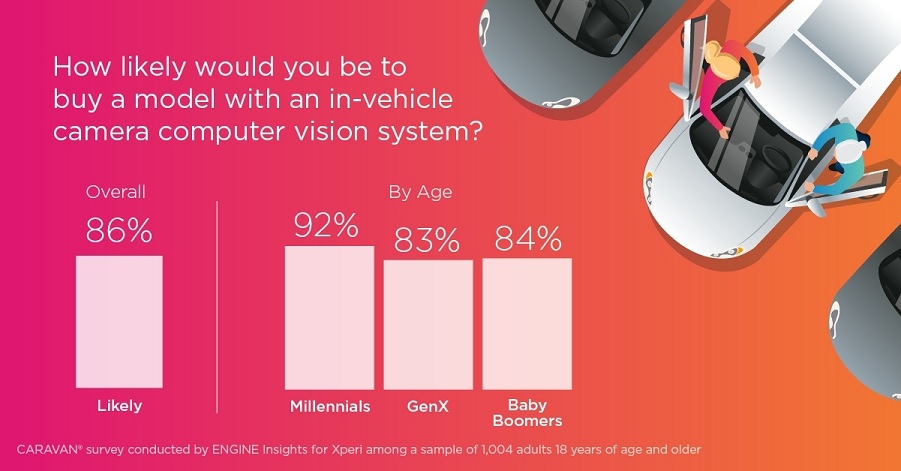Not only is safety important to 98% of consumers in their vehicle purchase choice, but 86% also said their likelihood to purchase a vehicle would increase if it had a safety-focused computer vision system, according to a new research study commissioned by Xperi and conducted by ENGINE Insights.
In addition, the survey revealed that consumers also look for personalization features such as automatically adjusting infotainment, wheel, and chair positions, and more.
"The survey uncovered car owners' interest (especially Gen Z and Millennials) in a vehicle future made possible by secure in-vehicle computer vision technology that provides increasing personalization of the in-cabin experience. From sensing the vehicle occupant/driver to automatically customizing playlists, lighting, and HVAC systems — to hands-free selfies and pay-on-the-go capabilities," said Jeff Jury, Xperi SVP and GM, Connected Car. "The safety benefits for drivers and occupants, especially children, of secure in-vehicle sensing, are profound, and these survey results are testament to that."
Younger Consumers want computer vision systems
Millennials (92%) overwhelmingly say that they are more likely to purchase a vehicle model/brand if it has a computer vision system that can detect children/pets left in a hot vehicle, seatbelt status, sudden sickness, driver drowsiness and other distracted driving indicators that trigger alerts to the driver.

Child Safety Top Priority
Child safety emerged as a key priority for car owners. In-vehicle computer vision systems that detect if a child is present and properly secured in the vehicle — and then trigger alerts to the driver — are considered beneficial by nine out of ten adults.
Seven in ten ranked the ability to detect a child left in a hot vehicle and trigger alerts as their top, or second most important, feature enabled by computer vision systems.
Pet safety (alerts if left in a hot vehicle), while carrying less weight than children, is of major importance to over a third of respondents (36%).
Health Checks, Personalization of Vehicle Interior/Infotainment
90% positively viewed a vehicle feature that could sense, in real-time, driver and occupant immediate health, and act on it to prevent accidents. Over half would like a sensing system that adapts their vehicle interior to driver/occupant preferences, such as wheel and chair position.
Just as appealing is a feature that detects if a child is present in the car to personalize in-cabin infotainment to be appropriate, chosen by 52% of respondents. 37% would like a feature that identifies, and reacts to, driver emotions to adjust settings, such as infotainment and lighting.
"Our research earlier this year underscored the increasing importance of the personal vehicle because of the pandemic. This new research reveals that car owners not only want those vehicles to be both safe and personalized, but that they also embrace the role of secure in-vehicle computer camera systems to make this possible," said Richard Tomasco, VP, ENGINE Insights. "While it is no surprise that 92% of respondents consider automation that can detect and notify drivers when they're drowsy, falling asleep, or not paying attention, to be beneficial, it is noteworthy that having that feature can influence vehicle purchase decisions, especially with the important Millennial cohort."
Methodology: The CARAVAN survey was conducted by ENGINE Insights among a demographically representative US sample of 1,004 adults ages 18 and older, comprising 502 men and 502 women. The survey was live August 2-4, 2021. Most questions in the survey were asked among consumers who own or lease a vehicle, or who plan to purchase one in the next year (N=900).




